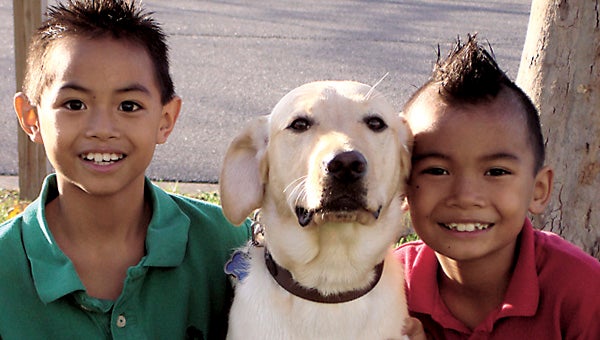Puppies with purpose
Published 4:12 pm Saturday, April 9, 2011

Eugene Martin, 10, and Richard Martin, 8, embrace Garvey, a yellow Labrador their family is raising to be a guide dog.
Kristin Martin and her family had just lost their dog when they began looking into Guiding Eyes for the Blind.
They found volunteering to raise a Guiding Eyes puppy was the perfect way to fill that void while at the same time giving back to the community.
But Martin said they have gained so much more from raising Garvey, a yellow Labrador.
After reading an article on Guiding Eyes for the Blind, a non-profit organization that breeds, raises and matches guide dogs with blind people who need them, Martin filled out an application to be a puppy raiser.
Before becoming a puppy raiser, Martin had to take a pre-placement class once a week for four weeks. After the classes, Garvey arrived at the Martins’ home at just 11 weeks old.
Of course, the needs of a new puppy can be expensive, but Guiding Eyes only requires that their raisers pay for the dog’s food, Martin said. The organization covers everything else, from leashes to veterinary care.
Guiding Eyes also provides three months of training classes for raisers and puppies to learn good behaviors and build a good foundation before their guide dog training.
Puppies like Garvey will eventually go on to their official training, where they will learn more specific skills like how to stop at intersections, going through revolving doors and using escalators to help their visually impaired owner.
“They can’t learn all those things when they are 12 weeks old,” Martin said. “Our responsibility is to make sure he has a safe and loving home.”
Martin said raisers don’t need any experience to train the puppies; in fact, she had never trained a dog before Garvey.
“They make it so easy for people who haven’t trained a dog before,” she said.
It is the puppy raiser’s responsibility to teach the dogs basic obedience and sociability. Martin said the most important thing for puppy raisers to have is the time to commit.
Garvey spends most of his time with Martin, just as he will spend most of his time with his visually impaired owner when he is matched. Raisers are not supposed to leave the puppies at home for long periods of time.
“You don’t want them to stay in their kennels because they aren’t learning anything,” she said.
Raisers also are responsible for exposing the puppies to various everyday situations they might encounter in their lives as guide dogs.
For example, Martin said Garvey goes to work with her husband to get to know the office environment and he goes with them to all of their children’s events, like basketball games.
Although Garvey wears a Guiding Eyes vest when he goes out, he doesn’t have all of the same regulations as a fully-trained guide dog, Martin said. While he does have a few rules, like sitting before he exits or enters a building, Martin encourages people to pet him.
“The more people he meets, it increases his reference level and makes him a better dog,” she said.
Garvey is about 16 months old, and in the next few months, he will leave the Martins’ care to start his official guide dog training.
After six months of training, Garvey has a lot of options. He might be placed in Guiding Eyes’ ‘Heeling Autism’ program in order to help provide safety to children with autism, or go on to do police work, Martin said.
If he decides to be guide dog at the end of his training, Garvey will be matched with a visually impaired person and begin his work.
The Martins will get the opportunity to meet Garvey’s owner when he graduates. She said seeing the graduates is a great motivation to participate in Guiding Eyes.
“Some graduates said when they walk with a cane, people shunned them, but when they walk with their dogs, they were more a part of the community,” she said.
The family will miss Garvey, but Martin said they don’t feel as though they are losing a dog. They think of Garvey’s next step as if he is going off to college to start his career.
“We’re really excited for him,” Martin said. “We know he’s going to be a great guide.”
Once Garvey graduates, the Martins hope to continue to raise guide dogs. Martin said the organization is always looking for puppy raisers.
For more information on Guiding Eyes for the Blind or to apply to become a puppy raiser, visit www.guidingeyes.org or call 1-866-GEB-LABS.





